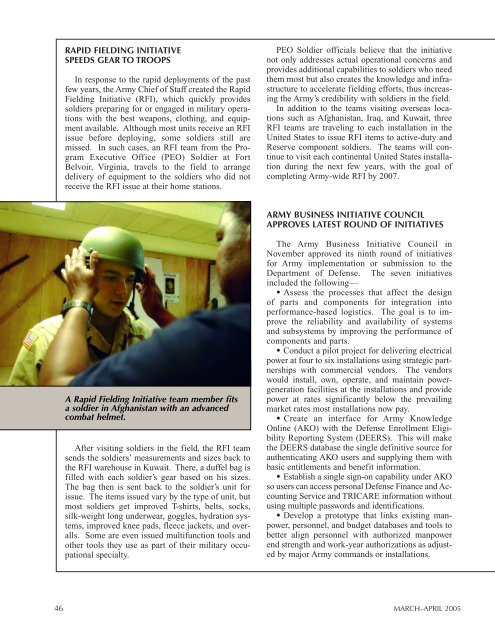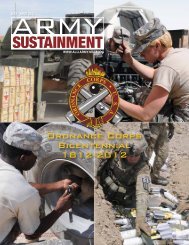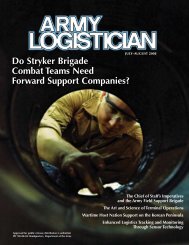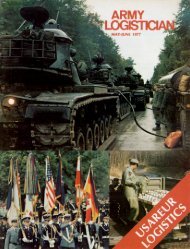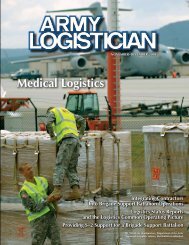Life-Cycle Management - Army Logistics University - U.S. Army
Life-Cycle Management - Army Logistics University - U.S. Army
Life-Cycle Management - Army Logistics University - U.S. Army
Create successful ePaper yourself
Turn your PDF publications into a flip-book with our unique Google optimized e-Paper software.
46<br />
RAPID FIELDING INITIATIVE<br />
SPEEDS GEAR TO TROOPS<br />
In response to the rapid deployments of the past<br />
few years, the <strong>Army</strong> Chief of Staff created the Rapid<br />
Fielding Initiative (RFI), which quickly provides<br />
soldiers preparing for or engaged in military operations<br />
with the best weapons, clothing, and equipment<br />
available. Although most units receive an RFI<br />
issue before deploying, some soldiers still are<br />
missed. In such cases, an RFI team from the Program<br />
Executive Office (PEO) Soldier at Fort<br />
Belvoir, Virginia, travels to the field to arrange<br />
delivery of equipment to the soldiers who did not<br />
receive the RFI issue at their home stations.<br />
A Rapid Fielding Initiative team member fits<br />
a soldier in Afghanistan with an advanced<br />
combat helmet.<br />
After visiting soldiers in the field, the RFI team<br />
sends the soldiers’ measurements and sizes back to<br />
the RFI warehouse in Kuwait. There, a duffel bag is<br />
filled with each soldier’s gear based on his sizes.<br />
The bag then is sent back to the soldier’s unit for<br />
issue. The items issued vary by the type of unit, but<br />
most soldiers get improved T-shirts, belts, socks,<br />
silk-weight long underwear, goggles, hydration systems,<br />
improved knee pads, fleece jackets, and overalls.<br />
Some are even issued multifunction tools and<br />
other tools they use as part of their military occupational<br />
specialty.<br />
PEO Soldier officials believe that the initiative<br />
not only addresses actual operational concerns and<br />
provides additional capabilities to soldiers who need<br />
them most but also creates the knowledge and infrastructure<br />
to accelerate fielding efforts, thus increasing<br />
the <strong>Army</strong>’s credibility with soldiers in the field.<br />
In addition to the teams visiting overseas locations<br />
such as Afghanistan, Iraq, and Kuwait, three<br />
RFI teams are traveling to each installation in the<br />
United States to issue RFI items to active-duty and<br />
Reserve component soldiers. The teams will continue<br />
to visit each continental United States installation<br />
during the next few years, with the goal of<br />
completing <strong>Army</strong>-wide RFI by 2007.<br />
ARMY BUSINESS INITIATIVE COUNCIL<br />
APPROVES LATEST ROUND OF INITIATIVES<br />
The <strong>Army</strong> Business Initiative Council in<br />
November approved its ninth round of initiatives<br />
for <strong>Army</strong> implementation or submission to the<br />
Department of Defense. The seven initiatives<br />
included the following—<br />
• Assess the processes that affect the design<br />
of parts and components for integration into<br />
performance-based logistics. The goal is to improve<br />
the reliability and availability of systems<br />
and subsystems by improving the performance of<br />
components and parts.<br />
• Conduct a pilot project for delivering electrical<br />
power at four to six installations using strategic partnerships<br />
with commercial vendors. The vendors<br />
would install, own, operate, and maintain powergeneration<br />
facilities at the installations and provide<br />
power at rates significantly below the prevailing<br />
market rates most installations now pay.<br />
• Create an interface for <strong>Army</strong> Knowledge<br />
Online (AKO) with the Defense Enrollment Eligibility<br />
Reporting System (DEERS). This will make<br />
the DEERS database the single definitive source for<br />
authenticating AKO users and supplying them with<br />
basic entitlements and benefit information.<br />
• Establish a single sign-on capability under AKO<br />
so users can access personal Defense Finance and Accounting<br />
Service and TRICARE information without<br />
using multiple passwords and identifications.<br />
• Develop a prototype that links existing manpower,<br />
personnel, and budget databases and tools to<br />
better align personnel with authorized manpower<br />
end strength and work-year authorizations as adjusted<br />
by major <strong>Army</strong> commands or installations.<br />
MARCH–APRIL 2005


